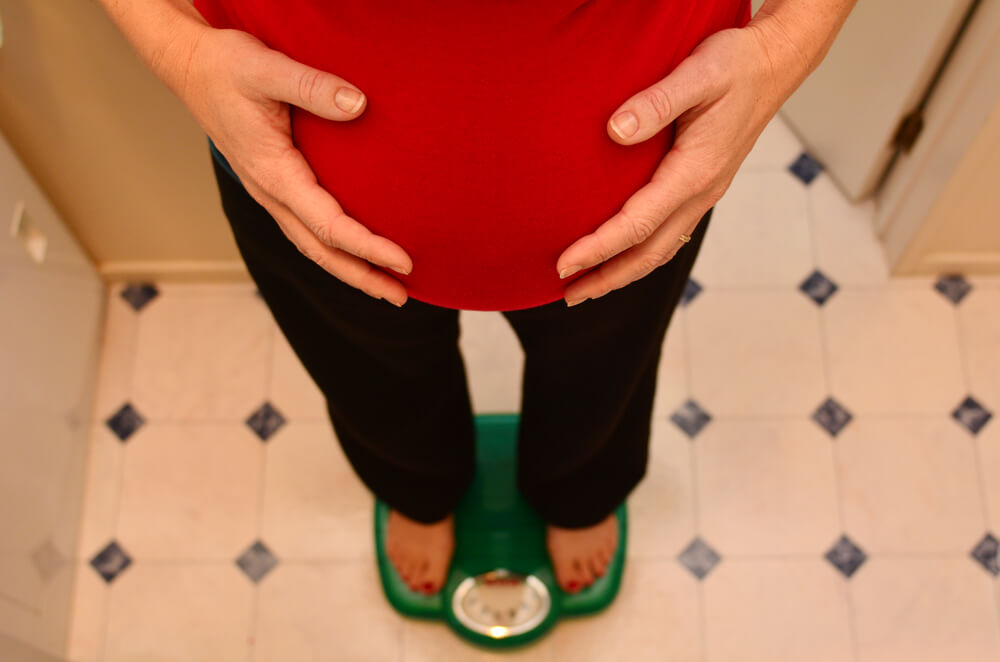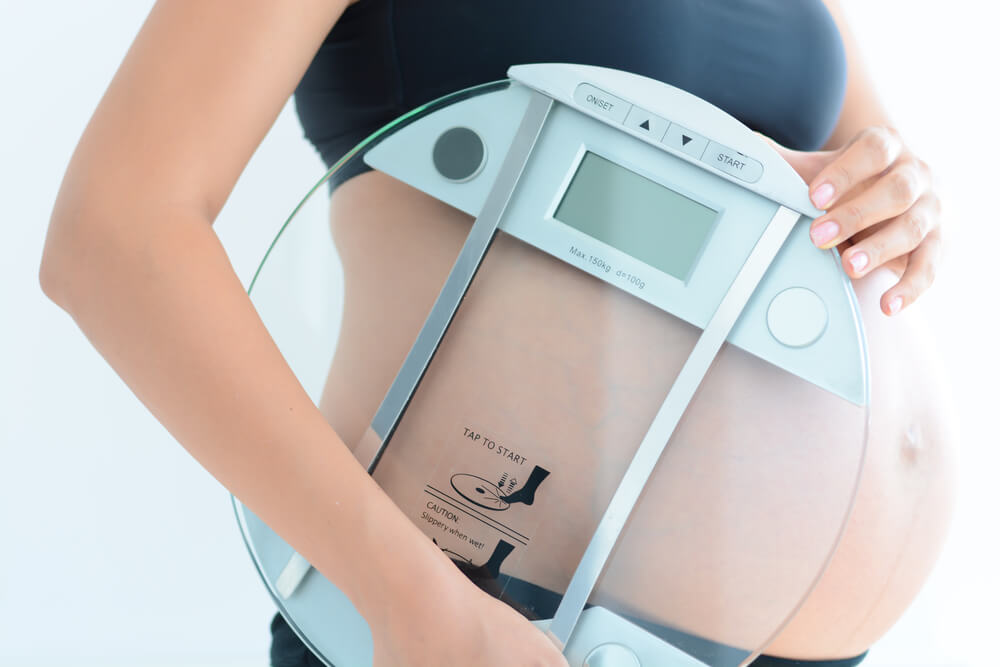Pregnancy is a wonderful event, and no mother wants health issues to arise. Doctors recommend that pregnant women gain 25 to 35 pounds during their pregnancy, but that’s for those of average weight. How much weight is too much? Let’s look at how being overweight and pregnant affects a mother’s health.
Weight Gain During Pregnancy
During pregnancy, doctors recommend that expecting mothers should gain a specific amount of weight depending on what their body mass index (BMI) is. If they’re in the normal range, they should gain 25 to 35 pounds. If they’re underweight, they should gain 28 to 40 pounds. If they’re overweight, they should gain 15 to 25 pounds.
Although it’s very common to think expecting mothers are “eating for two,” that’s not the case. The number of extra calories they need for their developing babies is only about 300. However, the quality of food also matters. Mothers will eat more if they have cravings for specific nutrients they aren’t getting.
According to the Institute of Medicine, pregnant women of normal weight don’t need extra calories during the first trimester. In the second trimester, they need 340 more calories a day and in the third, 540 calories.
As a rule, weight gain should be no more than 2 to 4 pounds during the first trimester and then a pound a week thereafter. This is enough weight gain not only for the baby but also to ensure the mother has enough fat energy for herself during the pregnancy and childbirth.
Those who are expecting twins, however, have different weight gain requirements. These women should gain 2 to 4 pounds during the first trimester and then 1 1/2 pounds per week afterward.
Proper weight gain depends on getting enough nutrients from food without adding excessive calories. Here is a breakdown of the weight gain, assuming 25 to 35 pounds:
• Placenta: 2-3 pounds
• Amniotic fluid: 2-3 pounds
• Baby: 8 pounds
• Breast tissue: 2-3 pounds
• Blood supply: 4 pounds
• Fat energy for delivery and breastfeeding: 5-9 pounds
• Uterus growth: 2-5 pounds
Causes of Overweight Pregnancy
Being overweight before pregnancy results in an overweight pregnancy. For mothers who were not overweight before pregnancy, however, it is the pregnancy itself that is the trigger for the excess weight gain. Other factors include becoming sedentary or having to take progesterone to prevent miscarriage.
Malnutrition makes overweight pregnancy, especially obese pregnancy, more complicated. Although much information exists on the effects of malnutrition, the same cannot be said for obese pregnancy. Obese pregnancy in particular is more common among populations that lack access to proper health care.

Effects of Overweight Pregnancy
Anyone who is familiar with the physical effects of excess weight by itself knows it can be a difficult struggle. Over time, fat accumulates over and in the organs, putting stress on both hard and soft tissues. Combine that with a pregnancy, and it becomes an even bigger challenge.
In fact, being overweight or obese increases problems with getting pregnant or the risk of infertility. An obese-level BMI makes it more difficult to conceive through in vitro fertilization (IVF) or check the baby’s heart rate during labor. Also, excessive body fat makes it difficult to see the baby during ultrasounds.
Many women who are overweight or obese wonder when their pregnancy will show, like women of any other weight. It depends on the individual. Sometimes, one of the overweight pregnancy symptoms is not having an obvious pregnancy. That’s because having an overweight pregnant belly means it takes longer for a baby bump to be physically visible.
Doctors’ concerns about overweight pregnancy risks are not only about the mother’s health but also that of her baby during gestation. The goal is for both mother and child to be as healthy and safe as possible during and after childbirth. The risk factors of overweight and obese pregnancies impact the short- and long-term health of mother and baby.
Overweight pregnancy occurs from having above-normal body weight or BMI during pregnancy, usually indicated by a BMI over 25. Obese pregnancy is when a pregnant woman has a BMI over 30. Overweight and obese pregnancy risks and complications for the mother include:
• Blood clotting problems
• High blood pressure and preeclampsia
• Gestational diabetes
• Longer pregnancy
• Problems with anesthesia
• The possible need for a cesarean section
Possible obese pregnancy risks and complications include those listed above and the following:
• Infections, such as urinary tract infections (UTIs)
• Obstructive sleep apnea
• Venous thromboembolism (VTE)
During childbirth, there could be difficulty passing the baby through the pelvis and a need for labor induction. There’s an increased risk of miscarriage or stillbirth. The mother could also have problems with breastfeeding.
For the child, there is an increased risk of
• Birth defects
• Macrosomia (large for gestational age, or LGA) or prematurity
• Low birth weight
There are also long-term health risks, such as obesity, Type 2 diabetes, and heart disease. If the mother has gestational diabetes, the child could develop issues with breathing. Additionally, babies could also be born with jaundice or low glucose levels.

Preventing Overweight Pregnancy
Whether you are already overweight or are at risk of having an overweight pregnancy, you don’t have to experience the health risks of an overweight pregnancy. The earlier you get screening for overweight or obese pregnancy risk, the better. Also, a specialist can put you on a plan to lose weight before conceiving. This is part of what is known as prepregnancy or preconception care.
First-trimester BMI and weight and mid-arm circumference measurements are often taken to assess obese pregnancy. Mothers experiencing overweight pregnancy still need to gain a certain amount of weight. The goal is not to lose or maintain the same weight during pregnancy but to gain no more than 15 to 25 pounds.
All prepregnancy care includes regular monitoring of your weight and physical health, which is normally a part of prenatal care. The difference is that for overweight or obese mothers, there is also screening for sleep apnea and possible changes to ultrasound tests, plus closer monitoring.
It is highly inadvisable to lose weight during pregnancy unless you are very overweight and your doctor wants you to. Your doctor will recommend changes to your lifestyle and nutritional intake to manage your weight. Your doctor will help you avoid the “empty calories” that pack on pounds and raise blood sugar levels but don’t satisfy hunger or nutritional needs.
Do not go on a diet, but instead, strive to be active every day and ask your doctor about safe activities and exercises during each trimester of pregnancy. It is a myth that pregnant women must stop physical activity until delivery. While the last trimester is susceptible to complications and risk factors that may require mothers to slow down or completely stop exercising, they can otherwise remain active during pregnancy.
Help for Dealing With Overweight Pregnancy
All mothers deserve the healthiest pregnancy possible. You do not have to experience health issues and complications from overweight pregnancy. With the right medical advice, you can manage your weight and have a more comfortable and healthy pregnancy for both you and your child. If you are overweight and pregnant and concerned about obese pregnancy risks, a high risk pregnancy specialist can help you.
We at Women’s Care of Bradenton seek to provide the most empowering care for pregnant women possible. Contact us today so we can help you on your pregnancy journey.


